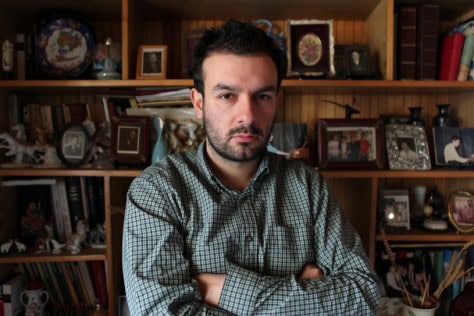There are a couple ways to take the title of Norwegian DJ & producer Lindstrøm’s epic new album, Where You Go I Go Too. One way is as a simple declaration of artistic intent directed at his fellow artists, as in, Where You, Manuel Göttsching, Go I Go Too or Where You, Metro Area, Go I Go Too. As such, the title is a a quiet manifesto and humble acknowledgment of the vast galaxy of influence from which Lindstrøm draws inspiration.
The other is as a mistake: maybe it was supposed to read Where I Go You Go Too, as in, I Am Awesome, and Because I Am So Awesome, Where I Go You Go Too, Such as on this Three-Day Three-City U.S. Tour. Because if Lindstrøm go to New York (or Chicago, or San Francisco), well, I go too.
Lindstrøm’s three-stop tour, which takes him through Chicago and ends in San Francisco, kicks off tonight with a 1 AM set at Studio B in Brooklyn. We got a chance to ask the Scandinavian sorcerer some questions before he crossed the Atlantic—take a look, and go where Lindstrøm go.
How you think of Where You Go I Go Too in relation to your earlier work? As a departure? A 'natural evolution'? What's its place in the Lindstrøm discography?
My earlier music is made with the single-format in mind, while this album is made to be an album as a whole. I've never actually done that before. Feedelity Affair is just a collection of singles, and all the other songs I've written since 2003 have been intended for the 12″ format. However, I got tired of single tracks after Feedelity Affair, and for the moment I'm only thinking albums before singles.
When approaching long epics like WIGYGT's title track, how much do you have planned out beforehand? Do you know the general structure of the track from the start of work, or do you make it up as you go along?
Nothing was planned beforehand—except that I wanted to make a really long track. I started [creating] lots of layers of keyboards on a very basic drum-loop. After listening to what I recorded, I started structuring the arrangement and adding new elements. In the middle of this process, I got ideas for chord progressions. And then I had to incorporate those into the song—which meant re-recording the previous layers. Back and forth all of the time! Because of the length of the track, it took me a longer time than usual to compose it. Mixing the track turned out to be the worst part, since I usually need to listen from start after changing something in the middle of the track.
What's the difference between working on a solo album, like this one, and a collaborative one, like the album you did with Prins Thomas? Is there a reason you wanted to work alone this time, instead of with Prins (or someone else for that matter)?
When working alone I'm responsible for everything; while working with Thomas we share the work. On the forthcoming album (L & P.T., II) I did most of the keyboards, while he played all the drums, most of the bass and guitars… and did the final mix. He does the mixing much faster than me, actually. I spend most time gluing everything together. It's great to work with other people, but after a while I desperately need to work alone. Sometimes it's nice to do everything alone, no compromises, no fighting.
Although WIGYGT is in some ways very forward-thinking, it seems to be revisiting and reinventing ideas from the past (for example, “The Long Way Home” sounds like a tribute to Michael Shrieve's “Transfer Station Blue”). What records were you listening to while you were making this album, and what kind of influence did they have? Do you think of yourself as a retro-minded artist?
Hah! or Supernature by Cerrone and Carouselambra by Led Zeppelin! Most of the songs I've written have references from older tracks. But this is the first time somebody has actually bothered claiming it to be a rip-off. I don't agree. For me it's more a tribute to music that I love. Creative sampling. I don´t really believe in 100 percent original music, since all music is related to the past in different ways. New music always incorporates elements from songs written before. Referencing the the past is okay as long as there's a certain amount of new or 'futuristic' elements… familiar and forward-thinking.
What's the relationship between your production work and your DJ'ing work? How do they influence each other? Are they comparable? For example—do you mix in the same way you produce? Do you think of DJ'ing as a performance (as you might a track), or as a job with a different set of goals?
I quit DJ'ing in 2004, when I started performing my own music on a laptop. However, I think that playing mostly in clubs has affected the way I perform my music live. I like mixing tracks into each other instead of waiting for applause in between tracks. Recently I've gotten more into creating new music while performing. Rather than just play the same old tracks over and over again, I use a lot of early versions of stuff I'm working on then. I believe a combination might be good: something for those who're there to hear the familiar tracks, something new for those who're interested in what´s coming in the future.
What's your take on the dance music scene in the United States? What's the difference between DJ'ing here or in Norway or in other places in Europe?
I've only played in the U.S. a few times. Playing in clubs in Europe sometimes leaves me with the impression that crowds want music for the body more than for the soul. People want to dance rather than listen. I used to be very concerned about making people dance. The ideal situation is when the crowd is doing a bit of listening as well. Last time I performed in the U.S., I really got the feeling that many of the people showing up to the gigs truly listened to what I did—which is great!
What's coming up from you in 2009? What are your plans for Feedelity and Strømland?
There're two albums in the pipeline for '09: first there´s the new album I've done with Prins Thomas which is going to get a release on Eskimo sometimes before the Summer. Then, after the Summer I'm releasing the album I've been doing together with the Norwegian singer Solale Christabelle on Feedelity/Smalltown Supersound. Hopefully we'll be releasing the Alf Emil Eik album on Strømland sometimes later this year. (He´s a Norwegian producer who put out an album in the late-70s on the legendary Harvest label. But since it's an amazing album which only got distributed in Scandinavia, we want to give the rest of the world a chance to listen as well!)
What are you most excited for in the new year, musical or otherwise?
Everyday life… and my new Otari 16-track 2″ reel-to-reel tape machine!
U.S. Tour Dates
January 29, 2009 ― Studio B (New York City, New York)
January 30, 2009 ― Smart Bar (Chicago, Illinois)
January 31, 2009 ― Paradise (San Francisco, California)
 Q&A with Larry Gus
Q&A with Larry Gus We Own the Night: The Edison
We Own the Night: The Edison
No Comments